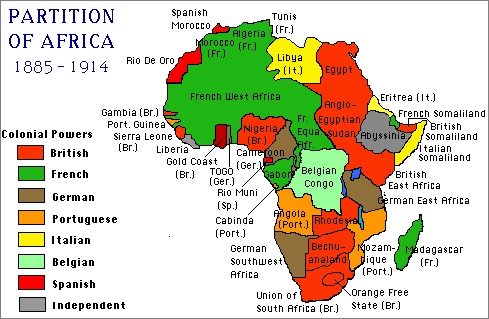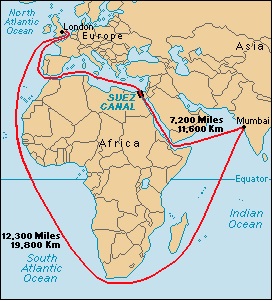Colonialism in Africa
by Devender
0 2043
Mainland of Africa had difficult terrains and other geographical features that were not easy to pass along with non-navigational rivers which ensured that colonialism has a late entry in the mainland Africa. Although, Colonialism was there for the coastal part of Africa from a long time.
Colonialism in Africa
By 19th century, due to voyages of many independent explorers and their publications about it, European got interested in navigating these inner lands of Africa. They found the way to get there and extract important mineral from mainland to coasts for export.
In 1876, Belgium King Leopold II became the first one to set up a colony in central Africa, he made Congo his private colony and controlled it. By 1914, whole Africa was divided into colonies by countries such as Britain, Belgium, France, Germany, Italy and Portugal but they were not able to colonize Abyssinia and Liberia.

There were numerous quarrels among the European forces for an area and exchanging rights in Africa. The covering cases of European prompted Berlin Conference in 1884-85, to determine debates with respect to West and Central Africa, which brought about outline of authoritative reaches of every provincial force in Africa. Niger and Congo waterways was made free for boats of all signatory countries.
Egypt was of unique interest to the British because of Suez Canal, which accommodated a shorter sea route to its Asian settlements, particularly India. Suez Canal was overseen by an organization with shareholding of France and the Governor of Egypt. In nineteenth century, Egypt was under monetary pressure and it needed to offer its shareholding to the British in 1875.

In 1876, Egypt wasn't able to pay the instalment of the credit it took from Britain and France. The two European forces arrange a Council for managing the spending plan of the Egyptian government and accordingly brought Egypt under monetary control. The high taxes and the deferral in payment on salaries to the Egyptian Army prompted a revolt in 1882. It was squashed by the British soldiers and Egypt was brought under British control.
In 1904, France perceived British rights over Egypt and Sudan in return for acknowledgment of its privileges over Morocco. In 1922, Egypt was given independence however Britain kept on controlling the Suez Canal.
Impact of Colonialism on Africa
- White settlers became elite
- Education and Health of people was neglected
- European became wealthy and powerful
- European controlled the government
- Africans were denied any political rights
- Blacks were forced to work as slaves
- Lands were taken away from Africans for cultivation and mining by colonists
- Killings of Africans for resisting loss of lands or slavery
- Whole villages were destroyed if resisted to colonial powers
Congo witnessed the first genocide of the modern era during the rule of Belgian king Leopold II. During 1876 to 1908, nearly 10 million African people were killed in Belgian Congo. Africa was divided into many colonies. Every colony have their boundaries and people from different cultures.
The idea of a single nation was thrashed from African minds. The divide and rule policy enabled colonists to control all tribes. Colonists gave power, money and arms to one favoured tribe and they were used to control other tribes.
The results of such mutual hospitality was catastrophic. Even after the independence, the country witnessed many tribal wars. One of such incidents happened in 1994, where the Hutu tribesmen killed millions of Tutsi tribe members. The lack of national unity still haunts Africa and it is till not possible to ensure functional democracy in Africa.
When Africa became independent, the illiteracy and poverty rate was very high. Further, no African were at any high posts in the Army. Both these factors affected Africa, the governments were failing on providing basic development, the government was constantly collapsing and they became dependent on the outside world which brought Neo-colonialism in Africa.
Health sector was additionally exposed to incredible disregard. Tribes experienced pandemics consistently given the damp conditions because of an Equatorial environment. HIV-AIDS today is generally predominant in Africa and Africa is the greatest mediation territory for WHO and NGOs. Above factors forestalled financial turn of events, and native business.
Africans didn't get the market cost for mineral assets which were sent out of Africa. Colonists made sure that no native industry gets developed here and Africa stays an exporter of crude material and merchant of completed merchandise produced in European plants.

Share:







Comments
Waiting for your comments